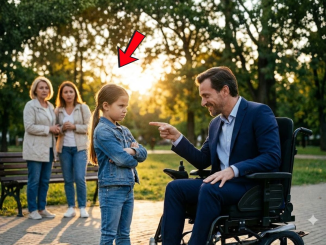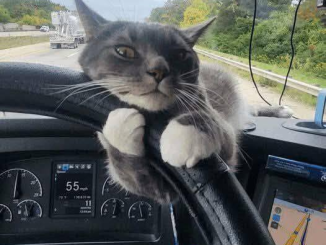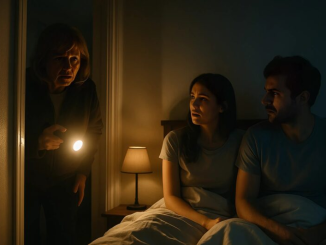
The first time my grandpa held my daughter, he cried. But I didn’t. I watched his hands too closely.
They looked so gentle wrapped around her, steady and careful like he’d done it a thousand times. Maybe he had. I was his first grandchild, after all. But no amount of softness in that moment could erase what my mom whispered in the hospital hallway the week before.
She waited until we were alone by the vending machine, like she was afraid of being overheard. Her voice shook when she told me. That all those “overnight trips” when she was little? He wasn’t traveling for work. He was living with another woman. Another family. For three years. And somehow, he just came back like nothing happened—like they owed him forgiveness.
I didn’t believe her at first. Until I called my Aunt Celia and heard the same story. Almost word for word.
So now, here I am, watching him smile like the perfect patriarch, rocking my daughter in that peach-covered onesie I bought in a panic the night my water broke. I wanted this photo to feel like legacy. Instead, it feels like performance.
He says, “She has your chin,” and I just nod. But all I can think about is the envelope I found in my mom’s attic. Postmarked 1984. Addressed to Linda K. with his handwriting on the front.
And as he leaned in to kiss my daughter’s forehead, I finally asked—
“Did she have your chin too?”
His face shifted. Just a flicker, but I caught it. The corners of his smile twitched. His eyes blinked a moment too long. He pulled back slightly, looking at me like I’d just spoken a language he hadn’t heard in decades.
“Who?” he asked, too quickly.
I shrugged. “Linda. The woman you were writing to in ’84.”
Silence wrapped around us like plastic. Tight. Crinkly. Suffocating.
He looked down at my daughter, then slowly handed her back to me. He stood there, hands now empty, and rubbed them together like he was washing off invisible guilt.
“Where’d you hear that name?” he asked.
“Mom. Aunt Celia. An envelope in the attic.”
He let out a breath that felt like it had been hiding in his lungs since Reagan was in office.
“I never meant for it to be like that,” he said.
I didn’t say anything. I didn’t need to. He knew exactly what I meant. What I wanted.
“You want the truth?” he asked. I nodded. He sighed and sat down on the edge of the hospital couch. He looked so much smaller than I remembered.
“It started in ‘81. I met Linda at a gas station off Route 23. I was driving back from one of your grandma’s doctor appointments—she was having bad back issues that year. Linda worked the register. She had this laugh… kind of like your mom’s, before she got bitter.”
“She’s not bitter,” I shot back, maybe too sharply.
He held up his hands. “Alright. That’s fair.”
He paused, as if trying to pick the right version of the story to tell me.
“I didn’t plan on anything. At first, I’d stop in for gas, maybe a soda. She’d flirt. I’d laugh. Then one night, I stayed late. We talked in the back of the store for hours. I told her I was married. I was honest.”
“But you still started a relationship,” I said.
He nodded, eyes cast down. “Yeah. I did. I was stupid. Lonely. Your grandma was going through a hard time. She wasn’t herself, and I… I was weak.”
“And you left. For three years.”
“No. I didn’t leave, exactly. I split my time. I lied to both families. I told your mom and Celia I had night shifts or training. Told Linda I was separated. I lived like that for too long.”
I held my daughter tighter, my heart hammering in my chest. “Did she know about us?”
“She did,” he said quietly. “Eventually. She knew I had kids. Said she didn’t care. She was lonely too.”
I wanted to scream. I wanted to ask him how he could tuck his daughters in at night and then drive across town to another home, to a woman who wasn’t his wife. But I didn’t.
Instead, I asked the question that had been clawing at the back of my mind since I read the envelope.
“Did you have another child?”
He looked up at me, and I swear—for the first time in my life—I saw shame in his eyes. Not guilt. Shame.
“Yes,” he whispered. “A son. His name’s Tyler.”
The name hit me like a brick. He had a son. My uncle. Someone I’d never met. Someone who lived a whole life in the background of ours. I sat down slowly, my knees weak. My daughter started to fuss, like even she felt the weight of the moment.
“Where is he now?” I asked.
“I don’t know,” Grandpa said. “I left Linda when she threatened to come to your mom’s school. I panicked. I cut ties. Sent a check every month, but never saw Tyler again.”
“And you just… came back? Pretended nothing happened?”
He winced. “I tried to tell your grandma. Once. She told me if I ever mentioned it again, I could pack my bags for good. So I buried it. I tried to be a better father. I tried to make up for it. But I guess I failed.”
I looked down at my daughter, now sleeping, her tiny fists curled into her cheeks. A knot formed in my throat.
“You didn’t just fail,” I said. “You disappeared. And Mom never got an apology. Just a father who smiled at birthdays and showed up at recitals like he hadn’t shattered her trust.”
He nodded slowly, hands folded in his lap.
“I deserve that.”
We sat there in silence. For a long time. The fluorescent light above us buzzed softly. Somewhere down the hall, a nurse laughed.
Then he said something I didn’t expect.
“I want to find him. Tyler.”
I blinked. “Now? After all this time?”
“I should’ve done it years ago. But seeing you with your daughter—it made me realize how much I missed. I have another grandchild out there, maybe more. I don’t want to leave this world pretending I only lived one life.”
A part of me wanted to yell at him. To say it was too little, too late. But another part—maybe the same part that had named my daughter after my mother—felt the weight of second chances.
So I said, “Then do it. Find him. But don’t expect a reunion. Don’t expect forgiveness.”
He nodded. “I won’t. I just want to try.”
That night, after we left the hospital, I sat in bed holding my daughter close. Her breath was warm against my neck. I kept thinking about Tyler. Was he out there? Did he know? Did he wonder why his father vanished?
Over the next few weeks, Grandpa kept his word. He hired someone to track Tyler down. It didn’t take long. Turns out, Tyler lived just two towns over. Worked in construction. Had a wife. Two kids.
But here’s where the twist came in—Tyler already knew. He’d known for years. Linda had told him the truth when he was fifteen. Showed him letters. Pictures.
And Tyler? He didn’t want anything to do with Grandpa. But—he was curious about us. About me.
So we met. In a coffee shop halfway between our towns. I brought a baby photo. He brought silence. But it wasn’t cold. It was… cautious.
“I’ve seen you at the grocery store,” he finally said. “Didn’t know we were blood.”
I smiled. “Neither did I.”
We talked for two hours. About our families. Our childhoods. How different and yet similar they were. He was kind. Guarded, but kind.
He didn’t want anything from Grandpa. Said he’d made peace with the past, but had no interest in reuniting. “Some scars close, but they still itch,” he told me.
Fair enough.
But the twist? A month later, Tyler came to my daughter’s christening. Stood in the back. Said nothing.
At the reception, he walked up to Grandpa. No handshake. No hug. Just a few words.
“She’s beautiful,” he said, pointing to my baby. “Make sure she never feels what I felt.”
Grandpa didn’t cry. He just nodded.
After that, Tyler and I kept in touch. Our kids met. Played. Asked questions about “Grandpa Frank” that we carefully deflected.
And slowly, the story changed. Not erased. Not forgiven. But rewritten with new chapters.
One day, when my daughter’s old enough, I’ll tell her everything. Because family isn’t just about love—it’s about truth. About facing it, even when it’s messy.
Grandpa never became the hero again. But he became something else. Honest. Quiet. A man trying, really trying, to carry the weight he once buried.
A year later, I found a letter in my mailbox. No return address. Just a single line:
“Thanks for letting me exist in your story.”
It was Tyler’s handwriting.
And I smiled.
Because sometimes, the reward isn’t in fixing the past. It’s in choosing a better future, one conversation at a time.
If this story moved you, hit like and share it with someone who believes in second chances. We never know who’s waiting for a seat at the table—we just have to be willing to pull up another chair.






Leave a Reply